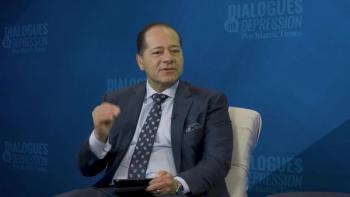
Experts continue their discussion of the first patient case, explaining how glutamate-modulating therapies could help improve his symptoms and outcomes.
Ms Crown is a psychiatric physician assistant in State College, PA. She is the owner and managing member of Oasis LifeCare, the owner of Future Options Research, and principal investigator in clinical trials.

Experts continue their discussion of the first patient case, explaining how glutamate-modulating therapies could help improve his symptoms and outcomes.

Experts use a major depressive disorder (MDD) patient case to provide clinical insights on managing MDD, and how they would educate patients about their condition.

Clinicians wrap up their discussion of three new agents approved for the treatment of major depressive disorder (MDD).

Clinicians continue their discussion of three new agents approved for the treatment of major depressive disorder (MDD).

Clinicians begin their review of three new agents approved for the treatment of major depressive disorder (MDD).

Experts highlight the current and prospective therapies for patients with MDD, highlighting key similarities and differences in patient pathophysiology, drug onset of action, and overall therapeutic limitations.

Experts discuss the impact of targeting glutamate receptors, highlighting its positive effects for patients with anhedonia.

Experts discuss the need to review current clinical guidelines in light of the need for rapid-acting treatment, especially as first-line treatments for some patients.

Clinicians discuss the particular benefits of rapid-acting agents for major depressive disorder (MDD), highlighting the gap glutamate-modulating agents fill in targeted therapies.

Experts continue their discussion on the role of glutamate receptors, explaining their role in stimulating neuroplasticity and neurogenesis.

Clinicians discuss the effects of glutamate modulation on neuroplasticity, memory, and cognitive function, highlighting their role in improving overall wellness for their patients.

Experts highlight the role of NMDA and AMPA receptors in major depressive disorder (MDD) and how new therapies are targeting novel mechanisms of action.

Clinicians discuss past treatment options compared to novel glutamate-modulating agents, highlighting their rapid onset of symptom relief.

Experts discuss the significance of glutamate in major depressive disorder, highlighting its links to neuroplasticity and stress.